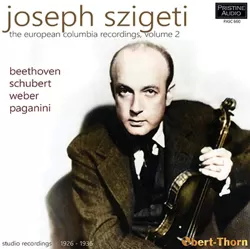
Joseph Szigeti (violin)
The European Columbia Records Volume 2
Kurt Ruhrseitz (piano, Beethoven, Paganini), Nikita Magaloff (piano, Schubert, Weber)
British Symphony Orchestra/Bruno Walter
rec. 1926-1936
Pristine Audio PASC660 [74]
This release from Pristine, the second of a four-part series, opens with one of Joseph Szigeti’s greatest recordings, the classic 1932 traversal of the Beethoven Concerto accompanied by Bruno Walter. There is not much left to say about this recording; it is a perfect mating of artist and repertoire. At this point in his career, Szigeti maintained technical control over his bow arm and experienced no significant struggles with intonation. His tone throughout the concerto is warm, even luminous. He makes every note count, playing with a nobility of expression that is intensely moving. Take for instance the brief G Minor episode in the development of the first movement. The tempo is arrested by Walter in the previous bar, giving Szigeti space to sing out at the moment when the Joachim edition orders the violinist to play “espressivo, ma teneramente.” (“Expressive, but tenderly.”) I can’t think of any other recording of the piece that quite captures this type of fragile but exquisite pathos. The orchestral accompaniment in the tutti sections as shaped by Walter is extremely fluid, rhythmically speaking. The touches of rubato, as well as sudden larger shifts in tempi, may be a bit much for modern listeners (Walter tends to hit the gas or brakes depending on shifts in dynamics), but it works for me.
The German violinist Willy Burmester (mislabeled here as “Burmeister”) made a cottage industry out of easy arrangements of “classics” such as this famous Beethoven Minuet. Szigeti plays it simply and with much charm. The Allegro Vivace from op. 30 no. 3 is given a ripping performance by Szigeti and Kurt Ruhrseitz, the latter a new name to me. A note about Ruhrseitz; he was an experienced accompanist who worked primarily with singers, appearing on tour in the United States with Frieda Hempel, Maria Jeritza, and Maria Olszewska, among others. Reviewers noted that he performed all his accompaniments from memory. Soon after making these recordings in London with Szigeti, Ruhrseitz joined the Metropolitan Opera in New York as an assistant conductor in 1927. He died a decade later after suffering a nervous breakdown, according to contemporaneous newspaper reports.
The arrangement of the Schubert Rondo by Carl Friedberg deserves to be performed by modern violinists; it works shockingly well for the violin, particularly when played with the sort of gusto exhibited here by Szigeti and Magaloff. In this violin/piano guise, it loses the “village band” nature of the piano original, taking on a more sophisticated sheen. The Weber Sonata no. 3 is lifted from a set of six short “Sonates progressives” intended for students. Szigeti makes the piece a bit more interesting by stealing many of the piano’s running right hand lines in the first movement and adding fast scales in contrary motion in the second movement. This presto movement is reminiscent of the breathtaking Menuetto (marked Presto vivace) of Weber’s Piano Sonata no. 4. The ease with which Szigeti sprints through this music and his command of a wide variety of bowstrokes make one wish that this period of fine technical fettle had lasted forever.
The three Paganini Caprices that end the disc further emphasize this impression. A listener who had only heard the violinist’s later fallible American recordings would not believe that this could possibly be the same performer. That Szigeti was able to get through this acrobatic music at all with his right elbow held so low is a minor miracle (watch his Hollywood performance of the Schubert ‘The Bee’ to see his cramped technical setup, an unfortunate inheritance from the Joachim school), but he emerges from Paganini’s thicket of notes unscathed and does so with panache. The piano accompaniment for the 24th Caprice by Ferdinand David isn’t nearly as interesting as the intricate version devised by Leopold Auer, but really, who cares when the playing is this good?
Mark Obert-Thorne’s transfers for Pristine are fantastic, as always.
Richard Masters
Previous review: Jonathan Woolf (October 2022)
Availability: Pristine ClassicalContents
Ludwig van Beethoven (1770-1827)
Violin Concerto in D major Op 61 (1806)
Minuet in G, G167, WoO 10, No 2, arr. Burmester
Violin Sonata No 8 in G major, Op 30 No 3: Allegro vivo (1802)
Franz Schubert (1797-1828)
Piano Sonata No 17 in D major, Op 53/D850, arr. Friedberg (1825)
Carl Maria von Weber (1786-1826)
Sonates progressives; Violin Sonata No 3 in D minor, Op 10 (1816), arr. Szigeti
Niccolò Paganini (1782-1840)
Caprice in B minor, Op 1 No 2 (pub 1820)
Caprice in E major, Op 1 No 9 La Chasse (pub 1820)
Caprice in A minor, Op 1 No 24 [two versions] (pub 1820)


















